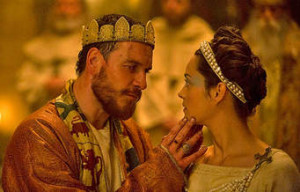This latest film version of Shakespeare’s concentrated, intense tragedy about the moral deterioration of a man spurred on by “Vaulting ambition, which o’erleaps itself” (remind you of any presidential candidates in the current crop?) is rather effective filmed theatre. At the beginning, we are shown a funeral of a young boy, the son of Macbeth (Michael Fassbender) and Lady Macbeth (Marion Cotillard). Lady Macbeth looms larger in the film than I am used to seeing and this is all to the good. After that we see Macbeth in battle fighting those rebelling against King Duncan (David Thewlis). These added scenes are meant, I suppose, to add to the characterization of Macbeth and his wife and can claim a certain legitimacy from the text of the play. An even more effective added scene is that showing Macbeth actually murdering Duncan. (In the play, it happens off stage.) That scene (as well as those of the murder of Banquo (Paddy Considine) and of Macduff’s wife and children) add to the horror. The depiction of the three witches, though, is not handled well. They are understated with little, if any, sinister quality. Maybe director Justin.Kurzel wanted to avoid making them cartoonish but the result is equally as bad: insipidity.
Despite all the strengths of the film (including fine acting by the two leads) , I experienced a certain disappointment. I know this is because I am a devotee of Robert Bresson (whom I have written about twice before here) and his deep, anti-theatrical films. But it is precisely in attempts to make conventional films out of great plays that the weaknesses of conventional cinema are perhaps most evident. Macbeth, a truly great play, still awaits a great transformation to film.


